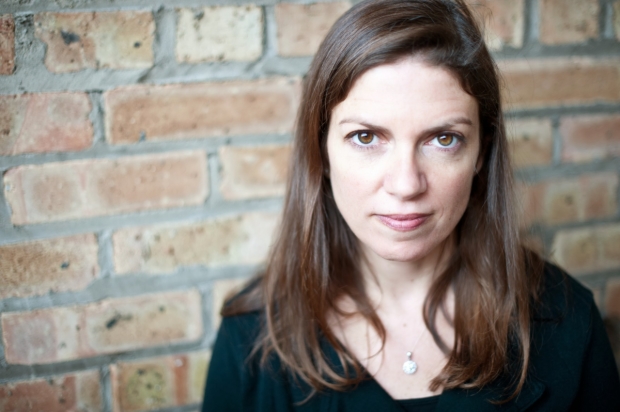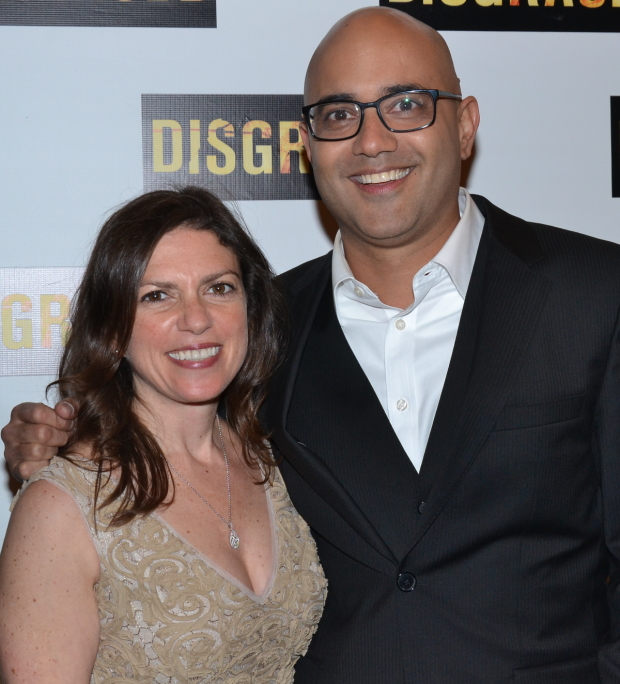Kimberly Senior Brings Disgraced Home to Chicago in Broadway Shape
Ayad Akhtar’s acclaimed drama comes to the Goodman Theatre with the director who predicted its prize-winning future.
How does a Jersey native wind up a staple of the Chicago theater scene? "I came out here twenty-one years ago for an internship at Steppenwolf and one thing led to another," says Kimberly Senior, whose first professional foray on the East Coast didn't come until 2012 with Ayad Akhtar's Disgraced. The Pulitzer Prize-winning one-act drama — rife with provocative discussions of Muslim-American identity — debuted at Chicago's American Theatre Company before transferring to Lincoln Center's smallest off-Broadway house, followed by a Tony-nominated run at the Lyceum Theatre.
Now carrying some Broadway clout, Senior is bringing the play back to the Windy City for a run at the Goodman Theatre, where locals who weren't able to witness its Broadway transformation, can see the complete life cycle of a piece that has become a national phenomenon.

(© Brandon Dahlquist)
Are you excited to be back with Disgraced in its native city of Chicago?
It's amazing. It just feels so new every time. I'm different than when I first encountered it; the world is different, my understanding of the material is different. To get a shot to deepen the material and find more nuance and complexity and sophistication is just fantastic. And then to get to do it where we began this journey is just super rewarding. The play is so different than it was when it was at ATC [American Theatre Company]. It's kind of unrecognizable.
In what ways has it changed since then?
Ayad and I continued to work on the script until we opened the play on Broadway. There are published versions of the script that aren't even what the script ended up being. And if he were sitting with me right now, we'd probably still be changing it. [laughs] In the original production at American Theatre Company, there were only three scenes in the play. Now there are four. The second scene where Amir [the protagonist] discovers the newspaper article about his visit to the imam — that scene did not exist. The characters are at least ten years older now, the whole structure and order of what happens in the fourth scene and how the play ends is completely different. The opening lines are different. The bones of the dinner party are probably the thing that has remained the most the same, although we have worked a lot on the comedy and the timing of the realism — like the "pass the bread" [and] stuff like that. We really refined that in a way that hopefully I don't have to be in the room and the play could still be made. Anyone could read the script and figure out how to do it.
Now that the play itself is finished, do you feel like you have more room to breathe in rehearsal?
For years, Ayad and I have been making "the play." My head was down, I've been looking at the script, if there was a problem that we couldn't solve in a scene, we would return to the script to help give the actor language to help them get what they need onstage. Now I feel like I sit in rehearsal and I don't even open my script. I'm looking up. I'm looking at the play that we're making. And if we can't figure something out, we have to figure something out. I'm giving myself more permission to not have the answer. I know people like this play, so I feel more comfortable to ask more questions.

(© David Gordon)
How does it feel be the first director to have put your stamp on what is becoming an iconic modern play?
I'm ridiculously moved and proud. I've worked on a lot of new work, [but] none of it has risen to the level that Disgraced has in terms of— there are going to be thirty productions in the next twenty-four months of this play. It's tattooed on me and I'm imprinted on the play too, [and] I think what the play is doing is so important. I was talking to the marketing department the other day about group sales, and normally, with group sales, you're targeting people who you're, like, "You're gonna love this play. This is right up your alley." With Disgraced I want to bring people in and be, like, "Hey, you might not agree with things that are being said here, but we need your point of view." A play can't be expected to represent every point of view, so how an audience interfaces with the work is really exciting, and I'm excited for the play to be in markets that aren't major metropolitan areas.
When Disgraced first came to you, did you think it was a play that could potentially have productions across the U.S., even though it's so politically controversial?
It's so funny. My answer is yes. This was [Ayad's] first play. At the time it was like one-and-a-half scenes long, his novel hadn't been published, he hadn't won any prizes. He was just a man. I feel like I have to say that because he's now this phenomenon. I'm reading hundreds and hundreds of plays a year, and the first time Ayad and I spoke I'm jumping through the phone at him saying, "This play is gonna win a f*ckin' Pulitzer Prize man." Direct quote. And he was like, "Oh shut up." [laughs] To him that was never going to happen. I just knew it. For whatever reason I had read the definition of the Pulitzer Prize that morning and I kept thinking [no one] is actually writing what this prize defines — this sense of an American play capturing a moment in our history. And I thought, "God, this is it." Never before or since have I read something that I feel so deserves its place in the canon. I see the origins of this play in Greek theater and Shakespeare and Edward Albee — it pays such beautiful homage to plays that have come before it without being derivative or a cheap facsimile. And yet it's something that's moving into the future. I always felt that way about it.
What is it about this play's politically charged content that initially made you think you could bring something special to it as a director?
There's something about this story — when I read it, I felt like it had to come from me. I've still been trying to identify what that is. There's a trauma at the center of this play that's about identity and about rage and about what we're running from and about love and all of those things are things that I feel like I've been wrestling with. I'm half Arab, I'm Jewish…I feel like sometimes in plays, I'm attracted to things that I'm, like, "Well, I better get right with my own identity before I try to guide an enormous group of people in telling this story."








